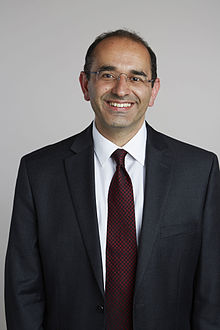Zoubin Ghahramani
Zoubin Ghahramani | |
|---|---|
 Zoubin Ghahramani in 2015, portrait from the Royal Society | |
| Born | 8 February 1970[5][6] |
| Alma mater | |
| Known for | |
| Awards | FRS (2015)[1] |
| Scientific career | |
| Fields | |
| Institutions | |
| Thesis | Computation and Psychophysics of Sensorimotor Integration (1995) |
| Doctoral advisor | |
| Website | mlg |
Zoubin Ghahramani FRS[1] (Persian: زوبین قهرمانی; born 8 February 1970)[5] is a British-Iranian researcher[2][7] and Professor of Information Engineering at the University of Cambridge. He holds joint appointments at University College London and the Alan Turing Institute.[8] and has been a Fellow of St John's College, Cambridge since 2009.[5] He was Associate Research Professor at Carnegie Mellon University School of Computer Science from 2003 to 2012.[9] He was also the Chief Scientist of Uber from 2016 until 2020. He joined Google Brain in 2020 as senior research director. He is also Deputy Director of the Leverhulme Centre for the Future of Intelligence.
Education
[edit]Ghahramani was educated at the American School of Madrid in Spain and the University of Pennsylvania where he was awarded a double major degree in Cognitive Science and Computer Science in 1990.[5] He obtained his Ph.D. from the Department of Brain and Cognitive Sciences at the Massachusetts Institute of Technology, supervised by Michael I. Jordan and Tomaso Poggio.[4][10]
Research and career
[edit]Following his Ph.D., Ghahramani moved to the University of Toronto in 1995 as a Postdoctoral Fellow in the Artificial Intelligence Lab, working with Geoffrey Hinton. From 1998 to 2005, he was a member of the faculty at the Gatsby Computational Neuroscience Unit, University College London.
Ghahramani has made significant contributions in the areas of Bayesian machine learning (particularly variational methods for approximate Bayesian inference), as well as graphical models and computational neuroscience. His current research focuses on nonparametric Bayesian modelling and statistical machine learning. He has also worked on artificial intelligence, information retrieval, bioinformatics and statistics which provide the mathematical foundations for handling uncertainty, making decisions, and designing learning systems. He has published over 200 papers, receiving over 80,000 citations (an h-index of 120).[11][12]
He co-founded Geometric Intelligence in 2014, with Gary Marcus, Doug Bemis, and Ken Stanley, which was acquired by Uber in 2016.[13] Afterwards, he transferred to Uber's AI Labs in 2016, and later became Chief Scientist at Uber, replacing Gary Marcus. In 2020 he joined Google[14] and became the Sr. Director of Google Brain in April 2021 after Samy Bengio's departure.
Awards and honors
[edit]Ghahramani was elected Fellow of the Royal Society (FRS) in 2015.[1] His certificate of election reads:
Zoubin Ghahramani is a world leader in the field of machine learning, significantly advancing the state-of-the-art in algorithms that can learn from data. He is known in particular for fundamental contributions to probabilistic modeling and Bayesian nonparametric approaches to machine learning systems, and to the development of approximate variational inference algorithms for scalable learning. He is one of the pioneers of semi-supervised learning methods, active learning algorithms, and sparse Gaussian processes. His development of novel infinite dimensional nonparametric models, such as the infinite latent feature model, has been highly influential.[1]
He was awarded the Royal Society Milner Award in 2021 in recognition of ‘his fundamental contributions to probabilistic machine learning’.[15][16]
References
[edit]- ^ a b c d Anon (2015). "Professor Zoubin Ghahramani FRS". London: Royal Society. Archived from the original on 17 November 2015. One or more of the preceding sentences incorporates text from the royalsociety.org website where:
"All text published under the heading 'Biography' on Fellow profile pages is available under Creative Commons Attribution 4.0 International License." --"Royal Society Terms, conditions and policies". Archived from the original on 25 September 2015. Retrieved 9 March 2016.
- ^ a b Zoubin Ghahramani publications indexed by Google Scholar
- ^ Zoubin Ghahramani author profile page at the ACM Digital Library
- ^ a b Zoubin Ghahramani at the Mathematics Genealogy Project
- ^ a b c d "GHAHRAMANI, Prof. Zoubin". Who's Who. Vol. 2008 (online Oxford University Press ed.). Oxford: A & C Black. (Subscription or UK public library membership required.)
- ^ "Zoubin Ghahramani curriculum vitae" (PDF). User zoubin at CMU. Retrieved 16 April 2014.
- ^ Ghahramani, Z. (2015). "Probabilistic machine learning and artificial intelligence". Nature. 521 (7553): 452–9. Bibcode:2015Natur.521..452G. doi:10.1038/nature14541. PMID 26017444. S2CID 216356.
- ^ "Zoubin Ghahramani". The Alan Turing Institute. Retrieved 5 August 2021.
- ^ "Curriculum Vitae" (PDF). Retrieved 20 July 2018.
- ^ Jordan, M. I.; Ghahramani, Z.; Jaakkola, T. S.; Saul, L. K. (1999). "An Introduction to Variational Methods for Graphical Models". Machine Learning. 37 (2): 183–233. doi:10.1023/A:1007665907178.
- ^ Wolpert, D. M.; Ghahramani, Z; Jordan, M. I. (1995). "An internal model for sensorimotor integration". Science. 269 (5232): 1880–2. Bibcode:1995Sci...269.1880W. doi:10.1126/science.7569931. PMID 7569931. S2CID 2321011.
- ^ Research in Focus – Building an Automated Statistician with Zoubin Ghahramani on YouTube, Microsoft Research
- ^ "Uber Buys a Mysterious Startup to Make Itself an AI Company". Wired. ISSN 1059-1028. Retrieved 7 April 2021.
- ^ "I am joining Google". Twitter. Retrieved 1 May 2021.
- ^ "Zoubin Ghahramani". royalsociety.org. Retrieved 27 September 2022.
- ^ "Probabilistic Machine Learning and Artificial Intelligence | Royal Society". royalsociety.org. Retrieved 27 September 2022.
External links
[edit]- Zoubin Ghahramani publications indexed by Google Scholar


 French
French Deutsch
Deutsch